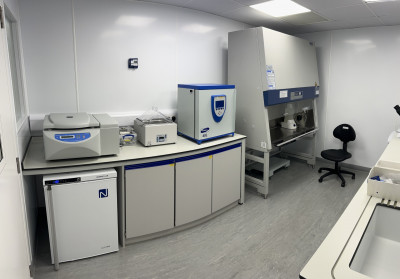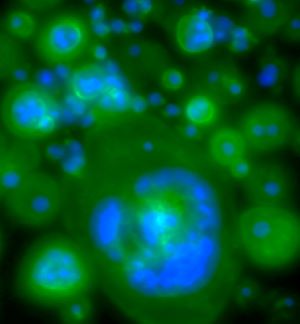News
Queen Mary University of London and Lucideon announce new in vitro cell lab
6 March 2025


A new in vitro cell biology lab at international technology company Lucideon, in collaboration with Queen Mary University of London, is set to accelerate product development in areas including medical devices, pharmaceuticals, consumer healthcare products, and novel materials.
Based at the company’s UK headquarters, the laboratory has been developed through collaboration with the School of Engineering and Materials Science (SEMS) and the Institute of Dentistry at Queen Mary, under a Knowledge Transfer Partnership (KTP) between Lucideon and the university, partially funded by Innovate UK.
Lucideon hosted Queen Mary postdoctoral researcher Dr David Shepherd for 30 months at its Staffordshire base. Dr Shepherd successfully transferred and embedded advanced cell biology expertise to the on-site team as a KTP Associate.
Tom Archer, Product Marketing Manager (Healthcare), said: “This is an exciting collaboration for Lucideon as we pioneer advanced methods for pharmaceutical and biotech product development.
“Cell biology involves the study of cells, their structure, behaviour, and function in response to stimuli.
“Understanding these processes is crucial for the R&D of materials and chemicals intended for contact with humans such as medical devices or pharmaceuticals.
“The new lab brings opportunities to offer a range of investigative and analytical solutions that support our customers' projects, including the R&D process of material and drug development, as well as the ongoing validation of products in the manufacturing stage.”
The collaboration builds on Lucideon’s long-standing relationship with SEMS at Queen Mary University of London, which has previously supported projects the company is developing in healthcare and implant materials.
The integrated cell testing facility expands on Lucideon’s established strengths in chemical and physical materials testing and complements Lucideon’s current suite of medical device services, allowing it to expand its client-based testing and consultancy business.
It will also result in an increase in critical data on material biocompatibility and performance for the business.
Prof Karin Hing from Queen Mary University London, said: “The KTP provided us with the opportunity to work with Lucideon to combine biomaterials innovation with translation of cutting edge in vitro cell testing practices to set up and validate a new commercial in vitro test facility within the company.
This could not have been achieved at the same pace, without either the expertise of the academic team or the company’s commercial perspective - it highlights the value of universities and industry working together to achieve impact.”
The new in vitro test facility at Lucideon will enable faster and safer innovation of pharmaceuticals and biomedical devices, to accelerate the translation of future healthcare developments from R&D to market more efficiently.
Moreover, Lucideon and Queen Mary will be able to further build on this initiative through Lucideon’s affiliate membership of the Queen Mary-based Centre for in vitro Predictive Models, with its recently launched state of the art organ-on-a-chip facilities, which brings together industry, regulatory authorities and other stakeholders to drive research the development and adoption of transformative in vitro cell testing technologies to accelerate the delivery of safe and effective healthcare solutions for the benefit of wider society.
| Contact: | Prof Karin Hing |
| Email: | k.a.hing@qmul.ac.uk |
| People: | Karin HING |




